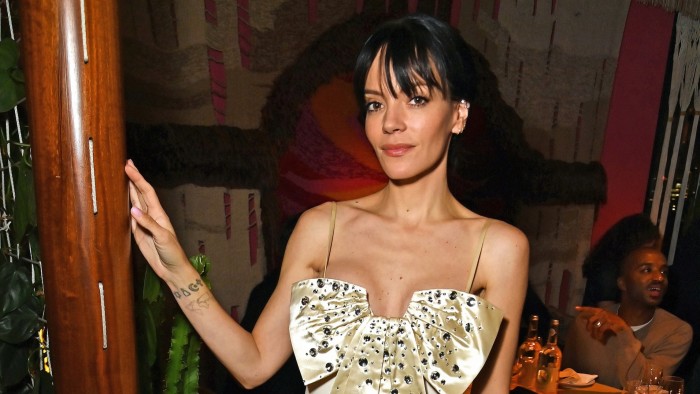Unlock the Editor’s Digest for free
Roula Khalaf, Editor of the FT, selects her favourite stories in this weekly newsletter.
It has been a fruitful time lately for infidelity, in the world of pop music at least. In the summer there was the trysting couple (married, but not to each other) who were caught in a guilty clinch by the kiss-cam at a Coldplay show in Massachusetts. Their furtive look as the camera picked them out in the stadium, compounded by the nightmarish sound of Chris Martin’s voice booming from the stage, speculating whether they were having an affair, was captured by a filming fan and posted on TikTok for the global village’s delectation.
This episode turns out to have been a mere amuse-bouche for the feast of revenge and scandal served up by Lily Allen’s new album. Released within a week of being announced, hot off the presses as it were, West End Girl is a headline-grabbing tale of adultery told by a scorned woman as she discovers the industrial scale of her errant husband’s duplicity. The story’s inspiration, with a lawyerly backing chorus of allegedlys and reportedlys, is the failure of the UK singer’s marriage to US actor David Harbour.
Allen calls it “autofiction”, by which she means that some details are true and others made up. But West End Girl is not a Karl Ove Knausgaard-style exercise in memory and deceptiveness, the untruths we tell ourselves. Instead, it uses dramatic licence to heighten what we are led to believe are real feelings of hurt and confusion at a spouse’s erotic licence, his cheating.
There is pain and candour here, but also scurrilous wit and an eye for telling detail, like the tennis-playing mistress Madeline, who signs off texts with the cringey endearment “love and light”, or the Duane Reade bag crammed with sex aids discovered in a West Village crash pad. The result is a break-up album in the grandly confessional tradition of Joni Mitchell’s Blue, transposed to an online age of kiss-cams and viral outrage.
Released in 1971, Blue is celebrated as one of the first break-up albums and also the best. The emotional entanglements that Mitchell sings about emanate from what we might today call celebrity culture. She wrote it after splitting up with a famous musician, Graham Nash, and starting an intense relationship with a newly famous one, James Taylor. But the Canadian has never named names herself.
Tittle-tattle about who she had in mind for figures like the jilted lover in “River” was unwelcome for her. “All people seemed interested in was the music and the gossip,” she said in 1972 after briefly giving up interviews: “I felt then that the music spoke for itself and the gossip was unimportant.”
That is the high-minded approach to delineating life and art. The artist pours her pain, joy etc into the work, leaving scuttlebutt about who really did what to whom to the yellow press and its prurient readers. But, over half a century after Blue’s majestic arrival into the world, it has become trickier to dismiss gossip as trivial.
Lily Allen’s recording career parallels the change. Her first hit single “Smile”, about schadenfreude at a faithless ex’s unhappiness, came out in 2006. This was a time when bloggers such as Perez Hilton and the newly launched scandal-rag website TMZ competed with tabloids for dirt to dish on celebrities. The sensationalism became increasingly voracious, often focusing on the uninhibited lives of glamorously wayward young women. (Sarah Ditum’s book Toxic is recommended for a deep dive into this.)
There is an element of exhibitionism in Allen’s willingness to expose the messy details of her life in her songs, perhaps stemming from her upbringing in a London showbiz family. But it also represents an artistic riposte to the amplification of gossip into a worldwide industry.
The person who filmed the couple being busted by Coldplay’s kiss-cam later said that she received no recompense from TikTok after her video went viral on the platform. The celebrities who furnish the likes of TMZ with fodder find their lives turned into commodities for others to profit from. In that respect, West End Girl is a masterstroke. It establishes an imaginative world in which Allen can both reveal and contain juicy titbits about her marital collapse. To repurpose an empowerment cliché Madeline might use, the singer here owns her truth.
‘West End Girl’ is released by BMG
Find out about our latest stories first — follow FT Weekend on Instagram, Bluesky and X, and sign up to receive the FT Weekend newsletter every Saturday morning

